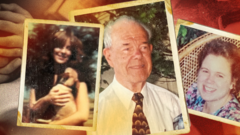Women associated with a clandestine Christian sect known simply as The Truth have recounted harrowing experiences of being forced to relinquish their babies for adoption due to church pressures. Between the 1950s and the 1990s, it is estimated that hundreds of adoptions occurred under coercive circumstances, according to testimonies gathered by the BBC from former members.
These disturbing claims emerge in the wake of a prior BBC investigation into decades of alleged child sexual abuse within the sect, which boasts an estimated 100,000 global followers. In light of the new allegations, the FBI has launched a formal probe.
The stories shared by four women reveal chilling accounts of psychological manipulation. Three of the women reported fears of being cast into eternal damnation, while one individual, who was 17 at the time, was coerced into giving her child to a church family after being raped. "My fear of going to hell was so great," she shared, recounting her overwhelming pressure to comply with the church's demands.
Some of the adopted children have since reported experiences of physical and emotional abuse within their adoptive homes. The adoptions, overseen largely by Dr. Wally Baldwin, a sect physician who passed away in 2004, are informally dubbed "Baldwin Babies." Despite the uncertainty surrounding the total number of adoptions, his adopted son, Gary Baldwin, estimates it could be fewer than 200.
Attempts to communicate with the sect's hierarchy yielded limited responses, with one overseer maintaining that all adoptions were legally conducted. However, mothers shared their traumatic experiences of being isolated, fearful, and manipulated into surrendering their children.
Melanie Williams, who relinquished her baby in 1981, expressed that the choices imposed by the church felt overwhelmingly punitive. "If I keep this baby, I can't go home," she said, articulating the emotional turmoil that many mothers endured.
Deb Adadjo described the poignant moments before her child's adoption, emphasizing the emotional reclamation tied to motherhood. The recollections of physical and emotional abuse within the adopted families resonate grimly with many of those who were placed into these environments.
The church's system lacked adequate oversight, resulting in vulnerable children being placed in potentially abusive situations. Former members have begun connecting via social media platforms to share support and reclaim their narratives. "It's been like finding my tribe," said Melanie, highlighting a newfound sense of solidarity.
Despite the persistent pain of their pasts, the survivors express hope for healing and understanding. They are determined to confront the church's legacy of fear and control, seeking accountability for the suffering endured by mothers and their children alike.




















